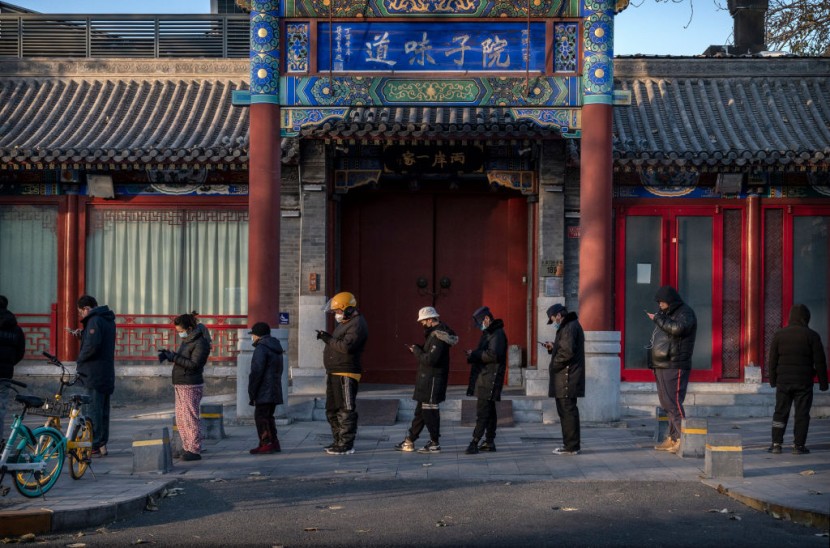
The Chinese government may ease its COVID-19 quarantine rules and reduce mass testing in the coming days, after a massive outcry over the world's strictest restrictions, according to sources.
While the total number of cases is still at record highs, several localities have begun removing lockdowns in the past few days, and a senior official has said that the virus's potential to cause sickness is waning, as per a Reuters report.
The demonstrations, which included anything from candlelight vigils in Beijing to clashes with police in Guangzhou, were the largest display of civil unrest in China in years, yet they were not mentioned in the announcements made by health officials in those locations.
According to reports, the steps to be announced would reduce mass testing and frequent nucleic acid tests and enable positive patients and close contacts to isolate at home within specified situations.
That contrasts sharply with prior procedures that angered the public by locking off whole neighborhoods following even a single positive case, often for weeks.
The economy is about to start a new phase in which growth will be much slower than it has been for decades. The discontent reached its peak last week in uncommon public resistance rallies in mainland China in the 10-year admnistration of Chinese President Xi Jinping.
A temporary curfew was lifted in at least seven areas of the huge industrial center of Guangzhou less than 24 hours after violent demonstrations broke out on Tuesday. One area said that it would once again permit the reopening of schools, restaurants, and businesses, including movie theaters.
Many municipalities, including Chongqing and Zhengzhou, have announced relaxations. Some neighborhoods in Beijing have also started preparing for the easing of restrictions.
Vice Premier Sun Chunlan, in charge of anti-COVID-19 efforts, recently told state media that the virus's potential to cause sickness was declining, adding to the perception of a course change.
State media cited Sun saying: "The nation is facing a new scenario and new challenges in epidemic prevention and control as the virulence of the Omicron virus lowers, more people are vaccinated, and expertise in confining the virus is gathered."
Sun also called for additional "optimization" of quarantine, treatment, and testing procedures.
End of 'Zero COVID' Looms
This statement contradicts prior warnings from officials about the virus's imminent danger.
In a research note, analysts at Nomura commented on Sun's announcement, saying that it "sends yet another strong signal that the zero-COVID policy will end within the next few months," which adds to the significant easing of COVID-19 restrictions in Guangzhou this week.
The experts believe the recent measures "may signal the beginning of the end of "zero-COVID" policy.
The "zero COVID" campaign, which seeks to quarantine every sick individual, has contributed to China's much lower case counts compared to the United States and other developed nations.
However, it has forced millions of people to spend up to four months inside their houses, and others have voiced concerns about a scarcity of dependable food and medical supplies, according to PBS.
Read Also: Ukraine Claims Russia Is 'Planning Something' That Could Affect the Southern Regions; NATO Pledges More Help for Kyiv
Last month, the governing party committed to minimizing disruption by modifying quarantine and other regulations. However, popular support is waning as cities tighten rules in response to an outbreak of infectious diseases.
Monday saw 40,347 new cases, including 36,525 without symptoms.
Protesters Urged Xi Jinping To Step Down
Last week's protests further intensified when 10 people perished in a fire that broke out in western China when firetrucks were prevented from entering a building by anti-COVID-19 gates and barricades due to harsh restrictions due to the latest outbreak.
The city of Urumqi erupted in demonstrations, and online voices of disapproval echoed across the city. But over the week, demonstrations spread to other cities around the nation, including Beijing and Shanghai.
Protesters' concerns escalated as the rallies rose in size, moving from criticism of the "zero-COVID" policy to open calls for the Communist Party and leader Xi Jinping to resign.
With large groups of shouting people marching through Shanghai's streets on Saturday, the scale of the demonstrations seemed to have taken the police by surprise, Barron's reported.
By late Sunday, officials had sent massive police forces to various locations and started investigations and arrests of individuals connected to the protests.
Read also: China Protests: Demonstrator Urging To Oust Xi Jinping Mysteriously Gone After Police Arrested Him








